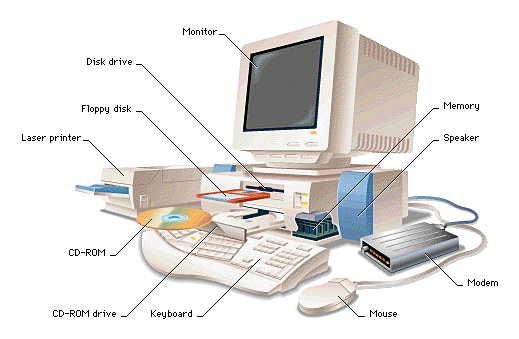
Computer
Computer is a tool used to process data according to procedures that have been formulated.
The word computer was originally used to describe people whose work performed arithmetic calculations, with or without aids, but the meaning of the word was then transferred to the machine itself. Originally, information processing was almost exclusively related to arithmetic problems, but modern computers were used for many tasks unrelated to mathematics. In that sense there are tools such as slide rules, mechanical calculator types ranging from abacus and beyond, to all contemporary electronic computers. Better terms that are suitable for broad meaning such as "computer" are "information processing" or "information processing systems." Over the years there have been several different meanings in the word "computer", and several different words are now referred to as computers. The word computer in general has been used to define people performing arithmetic calculations, with or without auxiliary machines. According to the Barnhart Concise Dictionary of Etymology, the word was used in English in 1646 as the word for "one who counts" then before 1897 is also used as a "mechanical counting device". During World War II the word refers to the United States and British women workers whose work calculates the artillery path of war with the counting machine. Charles Babbage designed one of the first calculating machines called an analytical engine. In addition, various simple machine tools such as slide rule can also be regarded as a computer.
Type
However, the above definition includes many specialized tools that can only take into account one or more functions. When considering modern computers, the most distinguishing trait of their previous counterpart is that of correct programming, all computers can emulate any trait (though perhaps limited by different storage capacities and speeds), and it is believed that machines can now imitate the computing tools that humans will create in the future (though undoubtedly slower). In a sense, this capability limit is a useful test because it recognizes the "general purpose" computer of an earlier mean intent tool. The definition of "general intent" can be formulated into the requirement that a machine must be able to mimic a universal Turing Machine. The machine that gets this definition is known as Turing-complete, and which first appeared in 1940 amid the flurry of developments around the world. See computing history article for more details of this period.
Hey just i want to tell one formation about stimeet it is has a robat for control Publications Movable You must accomplish Publications from your own and keep going don't give up ❤
how i accomplish my publications ?
Search for information About any subject You can even search in Google On information but do not Copy it completely As the original version Put it in your own way Select the appropriate tag for your topic Good luck I hope you have benefited
Hi! I am a robot. I just upvoted you! I found similar content that readers might be interested in:
https://silenttechblog.blogspot.com/2018/01/what-is-computer-you-must-know.html